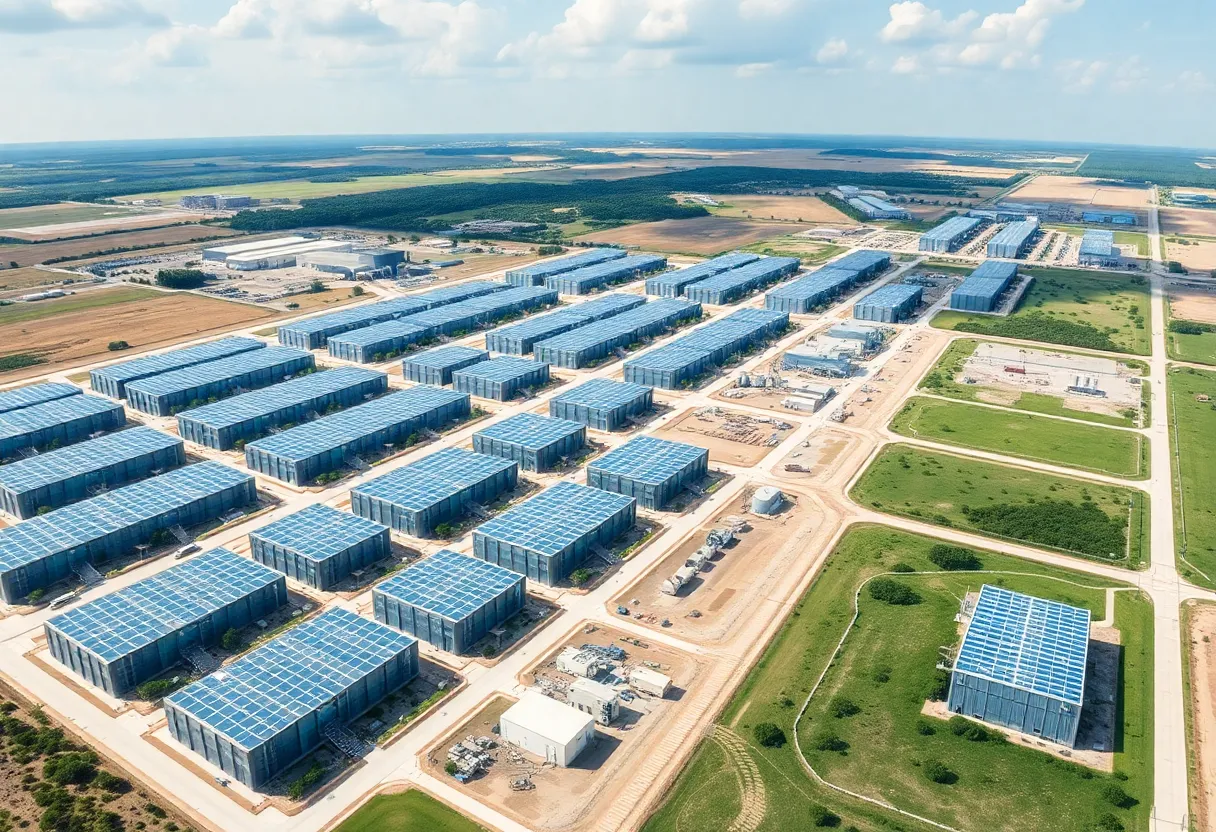Dallas-Fort Worth, September 29, 2025
News Summary
Dallas-Fort Worth is experiencing a surge in data center development, largely driven by the growing demand for artificial intelligence. The region is transitioning from smaller centers to larger facilities to accommodate increased information storage and processing needs, with notable investments from major companies like Google. As the demand for power and resources escalates, local leaders are balancing economic growth with environmental concerns. Industry forecasts predict significant expansion in the coming years, highlighting D-FW’s central role in the national data center landscape.
Dallas-Fort Worth
Data center boom driven by AI strains resources, reshapes region
Dallas-Fort Worth (D-FW) is witnessing a data center boom propelled by the rising demand for artificial intelligence (AI). The region has become a focal point for data center development as new, factory-sized facilities replace smaller, office-style centers to meet sharply increased information storage and processing needs.
Key developments and scale
D-FW has become a focal point for data centers, with new facilities consistently emerging across the region. D-FW ranks as one of the most significant and active data center markets nationwide, bolstered by Texas’ cheap energy and supportive business climate. The state houses approximately 388 data centers, with 190 situated in D-FW as of last year.
NTT Data operates over 150 facilities globally, including several in North Texas, showcasing one of the most aesthetically pleasing data centers in Garland. NTT’s Garland campus will expand to a total IT space of 124 megawatts with new data centers TX2, TX3, and TX4. High-profile companies are investing significantly in data centers, including Google’s $1 billion investment in Red Oak and Midlothian.
Industry forecasts point to rapid near-term expansion. CBRE forecasts a doubling of D-FW’s data center inventory by 2026, projecting at least 605 megawatts worth of projects under development. Texas had around 41 million gross square feet of data center capacity, predominantly in D-FW, generating over $1.6 billion in state tax revenue.
Energy, water and infrastructure pressures
Historically, data centers required 30-50 megawatts of power, but newer centers are demanding between 700 and 800 megawatts. The peak load of a single large data center can equate to the demand of medium-sized cities, placing new strains on local electric grids and infrastructure planning.
Emerging technologies such as AI are anticipated to drive energy demand significantly, with potential for data centers to consume up to 12% of the country’s electricity. Concerns are growing about water use for cooling and emissions from power consumption as projects expand.
Policy makers and grid operators are responding to higher electricity needs, while local leaders weigh economic benefits against environmental and resource impacts. Industries and communities are actively seeking data center projects for job creation and economic growth, even as the environmental footprint of these facilities draws closer scrutiny.
Sustainability and technology responses
Operators and developers are testing and deploying new cooling and efficiency technologies to reduce water and energy impacts. Solutions include liquid cooling methods and waterless cooling systems. Some projects are being built with sustainable technologies from the start, aiming to limit water consumption and greenhouse gas emissions while maintaining compute capacity.
Investors have shown growing excitement about data center growth, particularly on Wall Street, as companies spend trillions on AI-related infrastructure. This investor interest is reinforcing development momentum while intensifying competition among states to attract projects.
Economic and planning context
Data centers now account for substantial commercial real estate demand in Texas and beyond. Vacancy rates have remained low and rents have increased as supply has struggled to keep pace with demand. The anticipated development pipeline suggests significant growth potential for data center facilities in the area over the next two to three years.
The balance of supporting robust technology sectors while being good stewards of environmental resources is emerging as a central planning challenge. Stakeholders must manage grid capacity, water resources, land use, and long-term economic goals as the sector scales.
FAQ
What is happening in Dallas-Fort Worth with data centers?
Dallas-Fort Worth (D-FW) is witnessing a data center boom propelled by the rising demand for artificial intelligence (AI).
How central is D-FW to the national data center market?
D-FW ranks as one of the most significant and active data center markets nationwide, bolstered by Texas’ cheap energy and supportive business climate.
How many data centers are in Texas and D-FW?
The state houses approximately 388 data centers, with 190 situated in D-FW as of last year.
What capacity and tax impact does Texas have in data centers?
Texas had around 41 million gross square feet of data center capacity, predominantly in D-FW, generating over $1.6 billion in state tax revenue.
What projects and investments are notable in the region?
NTT’s Garland campus will expand to a total IT space of 124 megawatts with new data centers TX2, TX3, and TX4.
High-profile companies are investing significantly in data centers, including Google’s $1 billion investment in Red Oak and Midlothian.
CBRE forecasts a doubling of D-FW’s data center inventory by 2026, projecting at least 605 megawatts worth of projects under development.
How has power demand changed for data centers?
Historically, data centers required 30-50 megawatts of power, but newer centers are demanding between 700 and 800 megawatts.
The peak load of a single large data center can equate to the demand of medium-sized cities.
What are the national energy implications?
Emerging technologies such as AI are anticipated to drive energy demand significantly, with potential for data centers to consume up to 12% of the country’s electricity.
| Feature | Value |
|---|---|
| Data centers in Texas | Approximately 388 |
| Data centers in D-FW | 190 (as of last year) |
| Texas data center capacity | Around 41 million gross square feet |
| State tax revenue from data centers | Over $1.6 billion |
| NTT Garland campus IT space | 124 megawatts |
| CBRE 2026 projection | At least 605 megawatts under development |
| Historic vs. new center power needs | 30–50 megawatts historically; 700–800 megawatts for newer centers |
| Potential national electricity share | Up to 12% of the country’s electricity |
Deeper Dive: News & Info About This Topic
HERE Resources
Texas Tech Receives $2 Million Grant for Semiconductor Education
Texas Labor Market Soars to New Heights
Dallas Business Leaders Discuss Financial Landscape
Uneekor to Open New Global Innovation Center in Dallas
Texas Stock Exchange Set to Launch
Feather Expands Furniture Rental Services to Texas
Texas Faces Water Scarcity Challenges Amid Growth and Data Center Expansion
Austin’s Surge in Jobs Highlights Cybersecurity Needs
Adom Industries to Invest $229.2 Million in Fort Worth
Texas Data Centers: Balancing Growth with Water Concerns
Additional Resources
- Dallas News: Data Center Market Insights
- Data Center Dynamics: New Projects in Dallas
- NBC DFW: DFW Data Center Boom
- Dallas News: Firm Expands Data Center Footprint
- D Magazine: Future of DFW Data Centers
- Wikipedia: Data Center
- Google Search: Data Centers Dallas
- Google Scholar: Data centers dallas
- Encyclopedia Britannica: Data Centers
- Google News: Dallas Fort Worth Data Centers

Author: STAFF HERE DALLAS WRITER
The DALLAS STAFF WRITER represents the experienced team at HEREDallas.com, your go-to source for actionable local news and information in Dallas, Dallas County, and beyond. Specializing in "news you can use," we cover essential topics like product reviews for personal and business needs, local business directories, politics, real estate trends, neighborhood insights, and state news affecting the area—with deep expertise drawn from years of dedicated reporting and strong community input, including local press releases and business updates. We deliver top reporting on high-value events such as the State Fair of Texas, Deep Ellum Arts Festival, and Dallas International Film Festival. Our coverage extends to key organizations like the Dallas Regional Chamber and United Way of Metropolitan Dallas, plus leading businesses in telecommunications, aviation, and semiconductors that power the local economy such as AT&T, Southwest Airlines, and Texas Instruments. As part of the broader HERE network, including HEREAustinTX.com, HERECollegeStation.com, HEREHouston.com, and HERESanAntonio.com, we provide comprehensive, credible insights into Texas's dynamic landscape.



